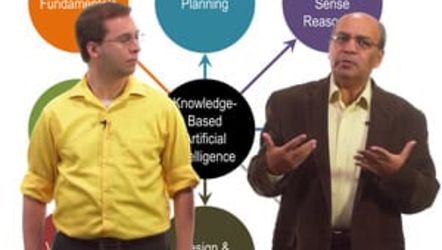
Knowledge-Based AI: Cognitive Systems
Summary
This class is offered as CS7637 at Georgia Tech where it is a part of the Online Masters Degree (OMS). Taking this course here will not earn credit towards the OMS degree.
This is a core course in artificial intelligence. It is designed to be a challenging course, involving significant independent work, readings, assignments, and projects. It covers structured knowledge representations, as well as knowledge-based methods of problem solving, planning, decision-making, and learning.
The class is organized around three primary learning goals. First, this class teaches the concepts, methods, and prominent issues in knowledge-based artificial intelligence. Second, it teaches the specific skills and abilities needed to apply those concepts to the design of knowledge-based AI agents. Third, it teaches the relationship between knowledge-based artificial intelligence and the study of human cognition.
Expected Learning
At the conclusion of this class, you will be able to accomplish three primary tasks. First, you will be able to design and implement a knowledge-based artificial intelligence agent that can address a complex task using the methods discussed in the course. Second, you will be able to use this agent to reflect on the process of human cognition. Third, you will be able to use both these practices to address practical problems in multiple domains.
Syllabus
Unit 1: Introduction to KBAI and Cognitive Systems.
- Where Knowledge-Based AI fits into AI as a whole
- Cognitive systems: what are they?
- AI and cognition: how are they connected?
Unit 2: Fundamentals
- Semantic Networks
- Generate & Test
- Means-Ends Analysis
- Problem Reduction
- Production Systems
Unit 3: Common Sense Reasoning
- Frames
- Understanding
- Common Sense Reasoning
- Scripts
Unit 4: Planning
- Logic
- Planning
Unit 5: Learning
- Learning by Recording Cases
- Incremental Concept Learning
- Classification
- Version Spaces & Discrimination Trees
Unit 6: Analogical Reasoning
- Case-Based Reasoning
- Explanation-Based Learning
- Analogical Reasoning
Unit 7: Visuospatial Reasoning
- Constraint Propagation
- Visuospatial Reasoning
Unit 8: Design & Creativity
- Configuration
- Diagnosis
- Design
- Creativity
Unit 9: Metacognition
- Learning by Correcting Mistakes
- Meta-Reasoning
- AI Ethics
Required Knowledge
A good course on computer programming such as CS 1332 or Udacity’s CS 101 is beneficial for students. An introductory course on Artificial Intelligence, such as Georgia Tech's CS 3600 or CS 6601, is recommended but not required.
To succeed in this course, you should be able to answer 'Yes' to the following four questions:
- Are you comfortable with computer programming?
- Are you familiar with concepts of data structures and object-oriented programming, such as inheritance and polymorphism?
- Are you familiar with concepts of algorithms, such as sorting and searching algorithms?
- Are you confident with either Java or Python?
Free
Advanced
7 weeks
Ashok Goel
Georgia Institute of Technology
Coursearena





